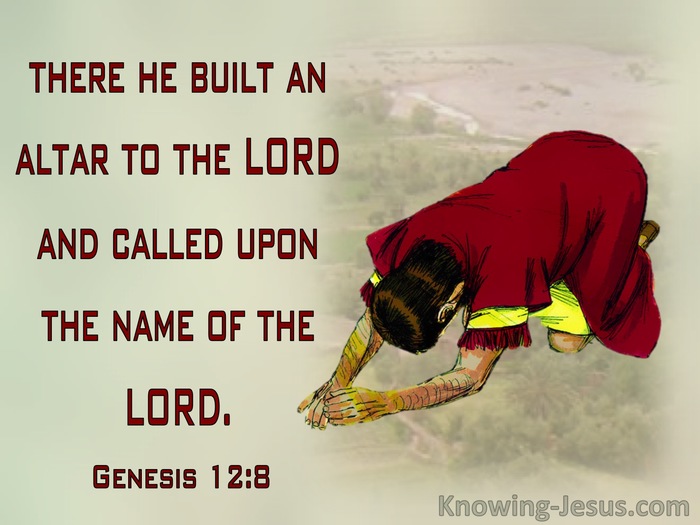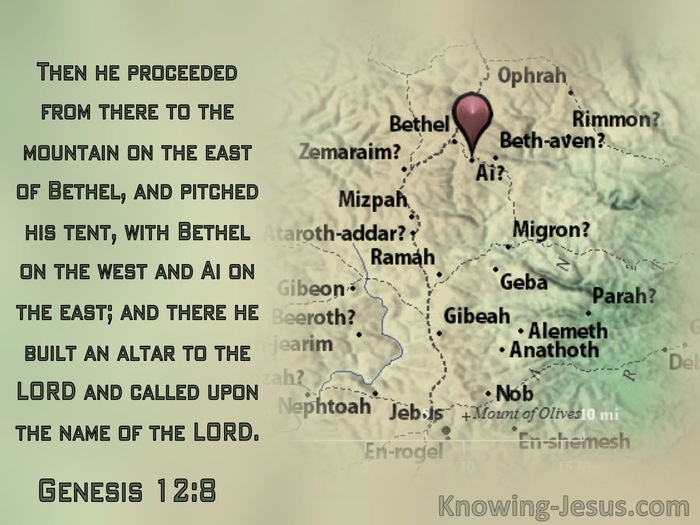◄ What Does Genesis 12:8 Mean? ►
Then he proceeded from there to the mountain on the east of Bethel, and pitched his tent, with Bethel on the west and Ai on the east; and there he built an altar to the LORD and called upon the name of the LORD.
Genesis 12:8(NASB)
Verse of the Day
The call of Abram (Abraham) in Genesis 12, sets the stage for much that follows. A wealthy, pagan man living in the ungodly city of Ur, was called to leave his home and family. He was to trust an unconditional promise received from God, that he would be made into a great nation. The Lord promised to provide for him, protect him from his enemies, make his name great, bless him abundantly, and cause him to be a great blessing to all the families of the earth.
Once the Lord spoke to Abram, he did not linger in the land of his birth but immediately set out on the long trek which would eventually take him to the Land of Canaan. Abraham knew nothing of God's plan nor was he told where he was going. When he set out, some of his relatives, including his father Terah and nephew Lot, decided to accompany him, together with many servants and his wife Sarah, who was barren.
Abraham was not told where he was going or what would happen along the way. His entire journey to the Promised Land (from Ur to Canaan), was embarked upon by faith. Abraham was saved because he believed God, saved by grace through faith in God's Word.
In the previous chapter, we are given a little insight into the journey they took which was significantly delayed because of his father, Terah. The company of travellers arrived in the town of Haran but remained there for about five years because Abraham's father worshipped idols, and the Lord would not allow his servant to continue to Canaan while his father was alive. It was only after his death that the excursion to the Promised Land was resumed, and at 75-years of age, Abraham once again set off on his journey-of-faith.
Hebrews 11 tells us that Abraham left his home and set out on to receive his inheritance by faith. It was because of this action that we read elsewhere: "Abraham believed God, and it was credited to him as righteousness." It did not take long to travel from Haran to the Promised Land and when he arrived in Canaan, we discover God graciously expanding His original promise.
Not only did God promise to give Abraham a land-inheritance, make him into a great nation, and bless all the families of the earth through him, but also that his vast estate was to be a permanent one. The Promised Land was to pass on to Abraham's descendants and in the previous verse the Lord appeared to Abram and said, "To your descendants I will give this land."
God informed his servant that the Promised Land was not simply a life-time inheritance, but one that would pass from one generation to another. Immediately he built an alter to God and offered a burnt-sacrifice of thanksgiving and praise. Considering that Sarah, his 65-year-old wife, was not only barren but too old to conceive a child, provides an insight into Abraham's trust in the Word of the Lord. We have a God Who often works with the impossible so He alone can be credited with praise when He performs His mighty work.
Having the wonderful blessing that was to be his inheritance, this hero of the faith went a little further on and in verse 8 we read: "Then Abraham proceeded from there to the mountain on the east of Bethel, and pitched his tent, with Bethel on the west and Ai on the east; and there he built an altar to the LORD and called upon the name of the LORD."
Abraham was in the land he had been promised, and the two towns mentioned would later be identified as important landmarks in the ongoing history of Israel, as recorded in Joshua and other biblical texts. When Israel crossed the Jordan into the land promised to their forefathers following their 40-year-long wilderness wanderings, it was the same land that the Lord had promised to Abraham and his descendants so many years before.
This is the first time 'Bethel', which means 'House of God', is mentioned in Scripture, and it was the place where Abraham: "Pitched his tent." Having arrived, he laid claim to the land God had promised. The Lord had brought his servant to the 'House of God' and once again Abraham built an alter to the Lord and 'called on the name of the Lord'.
This was the first time we read that Abraham: "Called upon the name of the LORD." The saving faith that brought Abraham out of a pagan land and a godless world, was deepening into an ongoing sanctifying faith where God would continue to prove His faithfulness to his servant; provide for him, protect him from his enemies, make his name great, bless him abundantly, and cause him to be a great blessing to all the families of the earth.
My Prayer
Heavenly Father, thank You for the Holy Scriptures, the many truths they teach me, and the lessons which I can learn from and apply in my daily life. I pray that like Abram, my faith would not fail but grow and develop so that I trust You in all the circumstances of life, even when they contradict my logic and seem to dictate the opposite. Thank You for the privilege of prayer and the wonderful example of a man who called on the name of the Lord and was not disappointed. Praise Your holy name! AMEN.
Choose a Verse from Genesis 12
Genesis 12:8 Further Study
- Genesis 12:8 in the Parallel Bible
- Genesis 12:8 in the Thematic Bible
- Genesis 12:8 Cross References
- Genesis 12:8 Treasury of Scripture Knowing
- Genesis 12:8 Sermons
- Genesis 12:8 Prayers
- Genesis 12:8 Images
- Choose Chapter
Never miss a post














